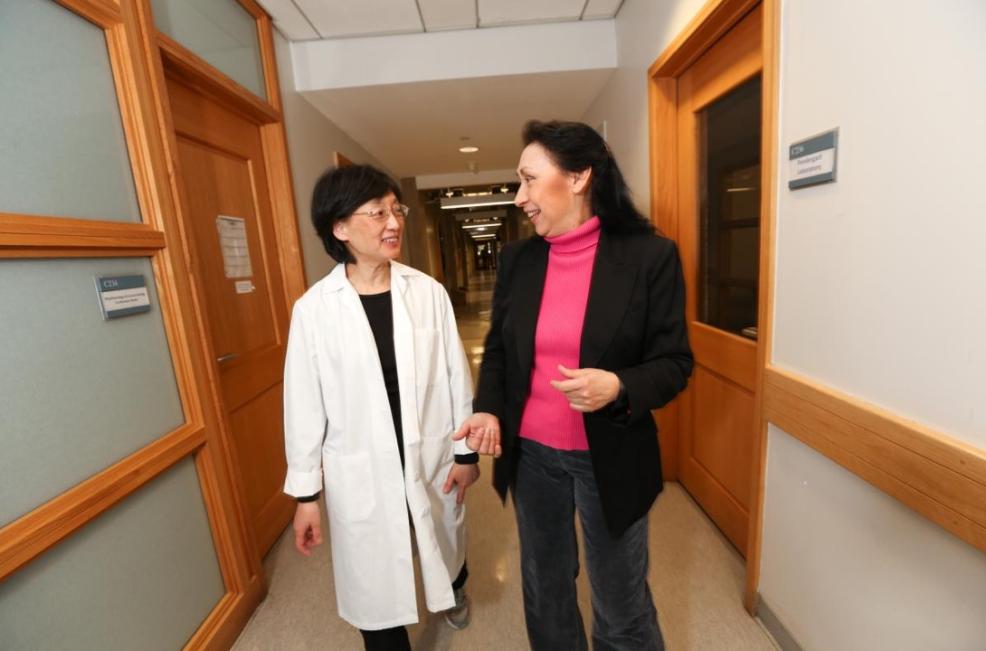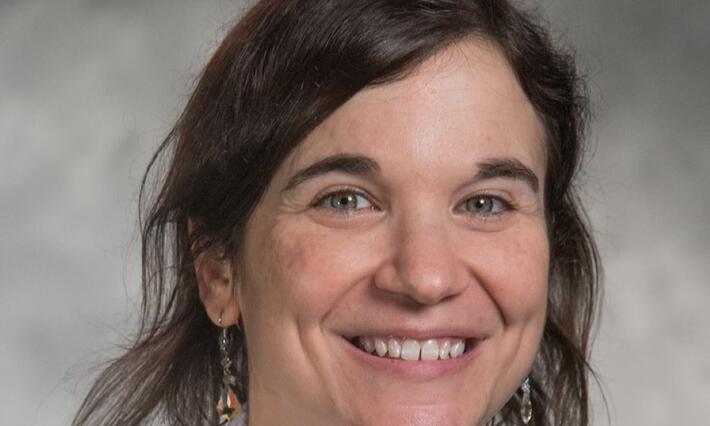Ann Marie Pendergast, PhD, the Anthony R. Means Cancer Biology Distinguished Professor (Department of Pharmacology & Cancer Biology), has received a two-year $150,000 Lung Cancer Research Foundation (LCRF) grant to continue her laboratory work “uncovering novel vulnerabilities to treat small cell lung cancer therapy resistance.”
The LCRF grant was one of two national awards bestowed by the nonprofit to recipients whose projects focus on combating therapeutic resistance. (National awards were also announced in the categories of prevention, diagnosis, treatment, and cure; early detection & pre-neoplasia; and minority career development).
Lung cancer is the leading cause of cancer death in the U.S. — accounting for 20% of all cancer deaths each year. While only 10% to 15% of all lung cancers are small cell lung cancer (SCLC), it’s the most aggressive subtype. Chemotherapy drug resistance easily develops and quickly leads to cancer spread.
“The overall 5-year survival rate for SCLC patients is only about 7% and has remained unchanged for over 30 years. Therefore, there is an urgent need to define the molecular mechanisms driving metastatic SCLC in order to identify novel and effective treatment strategies against this deadly cancer,” explained Pendergast, who’s been a member of Duke Cancer Institute since 1992.
The Pendergast Lab focuses on the role of tyrosine kinase-regulated signaling networks in tumor progression to metastasis. Early research led to seminal discoveries defining the critical pathways employed by the BCR-ABL tyrosine kinase enzyme to induce leukemia. An ABL001 inhibitor (Asciminib), was FDA-approved in Nov. 2021 to treat patients with chronic myeloid leukemia who have an activated variant of the ABL kinase.
More recent work from the Pendergast Lab has shown that ABL kinases are activated in a subset of highly metastatic solid tumors, including lung tumors. She and her team believe that inhibition of ABL kinases might be exploited to treat these tumors even after metastatic dissemination and that their effectiveness might be enhanced by the use of combination therapies, including targeted therapies or standard chemotherapies.
Using diverse human SCLC cell lines and mouse models, Pendergast and her team have found that targeting ABL tyrosine kinases causes a profound decrease in SCLC growth and viability across multiple SCLC subtypes.
They also identified metabolic and replication stress-induced pathways with the synergistic potential to induce the death of metastatic and therapy-resistant SCLC cells in the presence of ABL kinase allosteric inhibitors such as Asciminib.
The LCRF grant will support research, using human SCLC cell lines and mouse models, by Pendergast and her team evaluating how combination therapies targeting these pathways in the presence of ABL allosteric inhibitors, including Asciminib, can be exploited for effective treatment of metastatic and therapy-resistant SCLC tumors.
This work will be performed by Pendergast Lab members Jing Jin Gu, PhD, senior research scientist, and graduate student Roberto Barbier, both of whom generated the data in support of this research, in collaboration with lung cancer researcher Trudy Oliver, PhD, a professor of in the Department of Pharmacology and Cancer Biology, and Lee Zou, PhD, professor and chair of the Department of Pharmacology & Cancer Biology.
The Lung Cancer Research Foundation awards its grants for “projects that show promise to make a sustained and lasting impact on the field of lung cancer research and lung cancer outcomes.”
“We are committed to supporting science that seeks solutions to lung cancer’s most challenging issues,” said Katerina Politi, PhD, Chair of LCRF’s Scientific Advisory Board and a cancer biologist and professor at Yale School of Medicine. “Breakthroughs can only happen if the most promising ideas of these talented investigators are funded.”
The LCRF grants are made possible, in part, by support from Bristol Myers Squibb and donations from LCRF’s many generous supporters.




